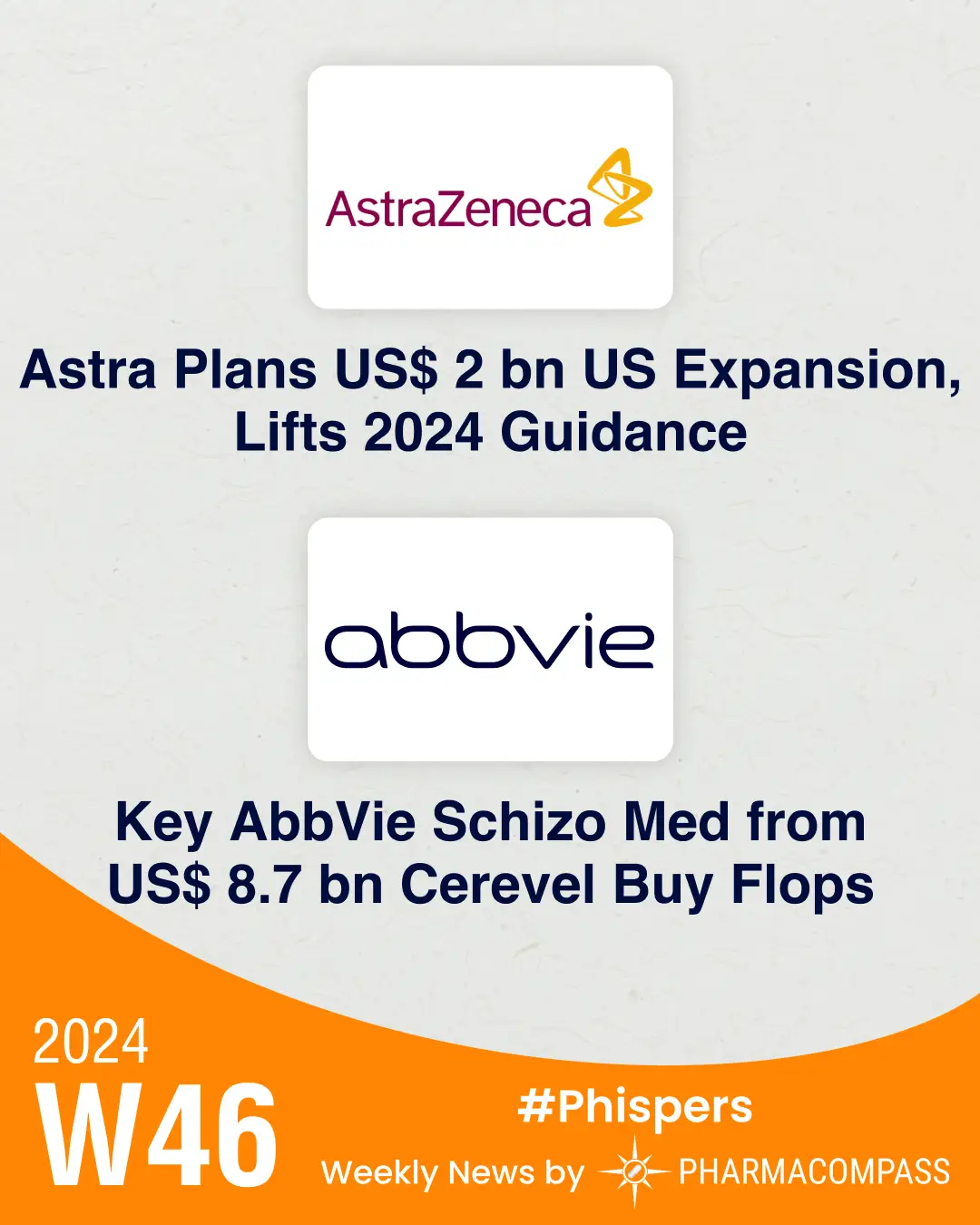
By PharmaCompass
2024-11-14
Impressions: 788 (Article) || 12 (Video)
This week’s Phispers is packed with news about deals. First, AstraZeneca announced a US$ 2 billion investment in the United States to enhance its R&D capabilities. Second, BioNTech said it is acquiring Chinese biotech Biotheus for up to US$ 950 million, gaining rights to a potential Keytruda competitor.
Third, Novartis forged a US$ 2.45 billion collaboration with Schrödinger, investing US$ 150 million upfront to leverage computational modeling for non-cancer drug discovery programs. And fourth, Roche has partnered with Flare Therapeutics in a deal worth up to US$ 1.8 billion to explore new pathways for cancer treatment.
With the US electing Donald Trump as its 47th President, there are concerns over the role Robert F. Kennedy Jr. might play in the new administration. He has said he plans to fire 600 employees from the National Institutes of Health (NIH).
Autolus Therapeutics received approval from the US Food and Drug Administration (FDA) for its CAR-T therapy — Aucatzyl. The agency also okayed Kebilidi, PTC Therapeutics’ gene therapy to treat an ultra-rare disease.
In news from clinical trials, AbbVie faced a major setback as its schizophrenia drug emraclidine failed mid-stage trials. And, FDA has proposed removing oral phenylephrine from over-the-counter cold medicines, questioning its effectiveness as a decongestant.
Astra invests US$ 2 bn in US R&D, manufacturing; raises 2024 revenue, profit guidance
AstraZeneca has announced a US$ 2 billion investment in the US to enhance its R&D capabilities, as well as expand manufacturing facilities, bringing its total investment in the US to US$ 3.5 billion by 2026. In light of strong third-quarter results, AstraZeneca raised its 2024 revenue and profit guidance, now expecting high-teens percentage growth, up from a previous forecast of mid-teens.
Despite this, the British-Swedish drugmaker is facing scrutiny due to ongoing investigations involving its operations in China. CEO Pascal Soriot stated that they are not privy to the details of these investigations, but are committed to cooperating with authorities if approached. Astra remains confident in its ambitious goal of achieving US$ 80 billion in total revenue by 2030.
BioNTech buys Biotheus for up to US$ 950 mn, gains potential Keytruda competitor
BioNTech has announced the acquisition of Chinese biotech firm Biotheus for US$ 800 million, aiming to enhance its oncology strategy by gaining full global rights to the investigational bispecific antibody BNT327/PM8002. This antibody targets both PD-L1 and VEGF-A pathways, positioning it as a potential competitor to established treatments like Merck’s Keytruda. The deal includes up to US$ 150 million in milestone payments.
Novartis, Schrödinger ink potential US$ 2.45 bn deal: Novartis has entered into a collaboration with Schrödinger, paying US$ 150 million upfront as part of a multi-target research agreement aimed at advancing several non-cancer drug discovery programs. The deal includes potential milestone payments of up to US$ 2.3 billion, along with an expanded software licensing agreement that enhances Novartis’ access to Schrödinger’s computational modeling technologies to support their drug discovery efforts.
Roche in over US$ 1.8 bn oncology pact with Flare: Roche has entered into a strategic collaboration with Flare Therapeutics, committing US$ 70 million upfront as part of a deal potentially worth over US$ 1.8 billion, aimed at targeting previously undrugged transcription factors in cancer. Transcription factors are proteins that bind to specific DNA sequences and regulate gene expression, playing a crucial role in controlling cellular processes.
AbbVie’s schizophrenia med, key asset from US$ 8.7 bn Cerevel buy, flunks phase 2 trials
AbbVie has announced that its schizophrenia drug, emraclidine, failed to meet the primary endpoints in two pivotal phase 2 trials. The drug was the centerpiece of AbbVie’s US$ 8.7 billion acquisition of Cerevel Therapeutics, which positioned the drug as a cornerstone of its neuroscience strategy. With shrinking Humira (adalimumab) sales, and the failure of this key asset, investors have begun questioning AbbVie’s long-term growth prospects.
RFK Jr. says he’ll fire 600 staff from NIH on day 1 of Trump 2.0; may pick new FDA head
Robert F. Kennedy (RFK) Jr., the former independent presidential candidate, is known to be a vaccine skeptic and an advocate for various unorthodox and unproven treatments. Public health experts are worried about how he could influence key government agencies. President-elect Donald Trump has promised to let RFK Jr. “go wild” on health.
RFK Jr. has suggested that on the first day of Trump’s second term, he plans to fire 600 employees from the National Institutes of Health (NIH). According to an Endpoints News article, RFK Jr. could pick an unconventional candidate to head the FDA. While Kennedy’s exact role remains somewhat ambiguous, he has expressed ambitions to reorganize health agencies and eliminate what he describes as corruption within them.
Autolus’ CAR-T therapy bags FDA nod, to compete with Gilead’s Tecartus, Novartis’ Kymriah
Autolus Therapeutics has made a significant leap in the CAR-T therapy landscape with its first FDA approval. Aucatzyl (obecabtagene autoleucel) was greenlit for treating adults with relapsed or refractory B-cell precursor acute lymphoblastic leukemia (B-ALL), a type of leukemia that either returns after remission or doesn’t respond to treatment.
The approval has positioned Aucatzyl as a formidable competitor in the CD19 CAR-T arena, where it will go head-to-head with established therapies like Gilead’s Tecartus (brexucabtagene autoleucel) and Novartis’ Kymriah (tisagenlecleucel). Notably, Aucatzyl is the first CAR-T therapy approved without FDA’s drug safety program requirement, known as Risk Evaluation Mitigation Strategy (REMS). This could simplify its administration and increase its adoption among treatment centers.
FDA okays PTC’s gene therapy for ultra-rare disorder: FDA has approved Kebilidi (eladocagene exuparvovec-tneq), PTC Therapeutics’ gene therapy to treat a potential fatal enzyme deficiency disorder. Kebilidi is a one-time treatment for children and adults with an ultra-rare inherited disorder known as aromatic l-amino acid decarboxylase (AADC) deficiency.
FDA may pull popular cold meds from shelves: For decades, consumers have relied on oral phenylephrine products to get relief from nasal congestion. However, FDA has said these meds do not deliver the promised relief and has proposed the removal of oral phenylephrine, the active ingredient in many over-the-counter cold and allergy medications. If finalized, this decision would require pharmacies to remove numerous products from their shelves, including NyQuil, Benadryl, and Sudafed.
The PharmaCompass Newsletter – Sign Up, Stay Ahead
Feedback, help us to improve. Click here
Image Credit : Phisper Infographic by PharmaCompass license under CC BY 2.0
“ The article is based on the information available in public and which the author believes to be true. The author is not disseminating any information, which the author believes or knows, is confidential or in conflict with the privacy of any person. The views expressed or information supplied through this article is mere opinion and observation of the author. The author does not intend to defame, insult or, cause loss or damage to anyone, in any manner, through this article.”







